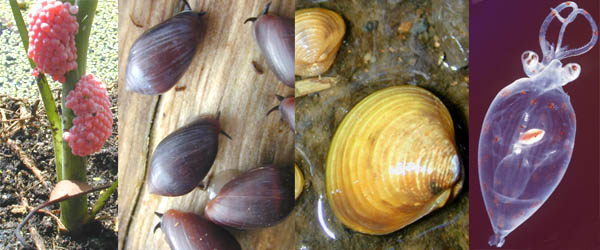Invertebrate Zoology/Mollusks
Chapter 11 ~ The Mollusks |
|
Contents ~ Introduction ~ Protozoans ~ Metazoans ~ Sponges ~ Cnidaria |
|
|
Introduction to the Mollusks
editMollusks are metazoan animals that take a variety of forms. However, almost all mollusks are characterized by a body with several main regions: a muscular foot, a visceral mass covered by a mantle that secretes a shell, paired gills (called ctenidia) and a unique feeding organ called a radula. The radula is a tongue-like organ that is covered with a chitinous ribbon with numerous rows of teeth, which are used to tear food off substrate and bring it into the mouth. In terms of species, they are the second-most diverse phylum next to the Arthropods, but few phyla can rival their diversity in form, from giant clams to minute sea slugs to fast moving squid.
Commonly accepted molluscan classes include:
Aplacophora
Monoplacophora
Polyplacophora (chitons)
Gastropoda (snails and slugs)
Cephalopoda (squid, octopus, nautilus)
Bivalvia (clams, oysters, mussels)
Scaphopoda (Tusk shells)
